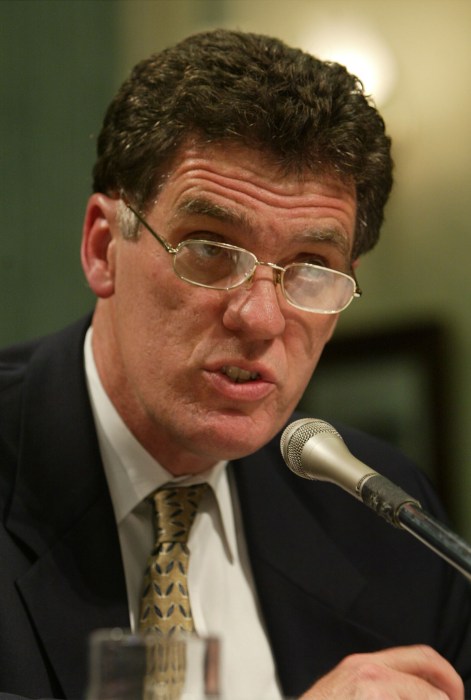Transportation authority to appeal decision
The Metropolitan Transit Authority stands to lose about $1.5 billion in revenue per year after a New York State Supreme Court judge ruled on Wednesday, Aug. 22 that the MTA payroll tax is unconstitutional. The MTA plans to appeal the decision made by Judge R. Bruce Cozzens Jr., according to a released statement last week.
This didn’t stop local officials from calling the ruling a “win for taxpayers” during a press conference last Thursday. Nassau County Executive Edward Mangano, along with numerous members of local and state government, were out in full force to applaud the decision, and plead to the powers that be to not grant a successful MTA appeal.
Employers located within the downstate area served by the MTA, which runs New York City’s buses, subways, commuter railroads and some major bridges and tunnels, pay the tax. The MTA serves 8.5 million passengers a day, according to its website. Its current budget totals nearly $13 billion.
Nassau officials asserted that the state needed home rule messages from the municipalities or a two-thirds vote in both houses of the State Legislature, neither of which occurred.
“The MTA payroll tax is a special law, which does not serve a substantial state interest,” Cozzens Jr. wrote in the decision. Because the state did not seek a home rule message, “this was passed unconstitutionally.”

Mangano filed the lawsuit in 2010. This was after the cash-strapped agency was looking to close a $1.8 billion budget gap, according to the supreme court decision.
Governor David Paterson enacted the tax in 2009. It was eliminated for small businesses with payrolls under $1.25 million and private and public school districts earlier this year.
“Today, we gather to seek retroactive relief from this unconstitutional tax,” Mangano said. “This costly tax has stifled economic growth by chasing employers and job creators out of our region.”
Employers pay as much as 34 cents per $100 of salaries via the payroll tax, according to figures released. Cozzens did not order or direct the state to stop collecting the tax.

The MTA noted in a statement that four previous lawsuits challenging the constitutionality of the payroll tax had been dismissed. Of all the cases with similar arguments, this case is the first to reach the appeal level.
“We will vigorously appeal [the Aug. 22] ruling,” the statement read.
Without the payroll tax or another source of funding, “the MTA may be forced to implement a combination of extreme service cuts and fare hikes,” the MTA statement read. “The Payroll Mobility Tax remains in effect for now, and we expect that it will survive this legal challenge.”
Nassau has paid $9.9 million in MTA payroll taxes since its inception, while county business owners have paid roughly $80 million per year. The county plans to seek retroactive relief for funds it has paid since the law was enacted. It is unclear if the county will be able to seek similar relief on behalf of county businesses, officials said last Thursday.
Mangano said if the MTA successfully appeals, he would rule out challenging that ruling.
“We’ll analyze that,” Mangano said. “Again, we call on them to listen with both ears to the loud message here that goes beyond the decision.”
“The ruling that the MTA Payroll tax is unconstitutional is a victory for Long Island taxpayers. Having strongly opposed this job killing tax since its implementation by the Senate Democrats in 2009, and supporting its repeal in 2011, I am pleased that this latest positive step has been taken to alleviate this unfair and significant burden on businesses, municipalities, libraries and employers across Long Island,” said Senator Charles Fuschillo. “I applaud the court for its decision and reaffirming what my Republican colleagues and I have long been saying; that the MTA payroll tax is unfair, unjust, and should never have been implemented.”
Legislator Joseph Belisi told the Observer, “I am very pleased that the court agrees with the unconstitutionality of this unfair tax, and I encourage the State Attorney General to abandon plans to appeal the ruling.” Similarly, Legislator Rose Walker told the Observer, “This is a great victory for Nassau County residents and business owners; it is my hope that the attorney general will uphold this ruling because it will help to stimulate economic growth throughout Nassau and other affected counties.”
The Village of Mineola, one of the original plaintiffs in the lawsuit, paid $21,000 per year and more than $70,000 since 2009. The village paid a portion of its share of the tax weekly, according to village officials. No positions have been cut from the village in order to help pay for the tax since Scott Strauss has been mayor.
Strauss believes that the money can be put to better use elsewhere in the village, especially with expenses such as a new gazebo, repairs to the fire-damaged snack stand at Wilson Park and the bids for the flood mitigation projects on Bruce Terrace and East Second Street looming.
“I’ll take that money,” Strauss said. “That’s money that I can use; I have some big issues coming up. The $21,000 is not a salary, an employee’s salary, but it’s something. Maybe I can fix a couple of park benches or maybe I can get some of these little things done. It’s a little bit of extra money that I have to do with to give back to the taxpayers.”
Senator Jack Martins, who was mayor of Mineola when the tax was implemented, said it was a “hell of a week for the MTA.”
“[The tax] was $270 million that was siphoned out of [Long Island] every year,” Martins said. [$270 million] that would go a long way towards restoring jobs and giving a boost to our small businesses…[Wednesday] was a victory not only for our local government and for our taxpayers, but a victory for our small businesses, our not-for-profits, our churches, each of which have been paying this payroll tax for three years.”






























